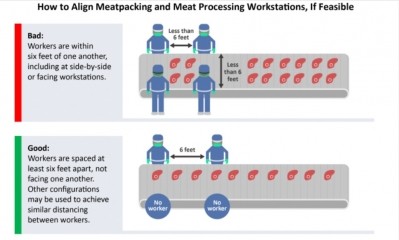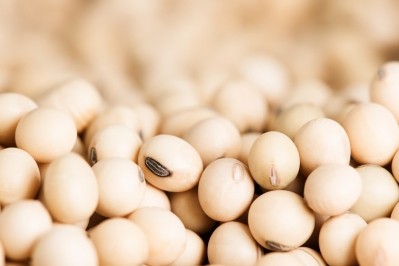Cargill Protein boss: ‘We are making decisions by the hour. I’ve been almost 30 years in the business and this is a unique situation’

Speaking to FoodNavigator-USA on Monday, Cargill chief risk officer Brian Sikes, who heads up the firm’s $22bn global protein* and salt businesses from Wichita, Kansas, said the typical 50:50 split in demand for meat & poultry between retail vs foodservice had “drastically shifted” to around 85:15 in the space of a week.
“At Cargill we were probably at around 60:40 retail to foodservice before this [COVID-19] and we’ve had to shift from foodservice to meet retail demand.
“Net demand [from retail and foodservice combined] is also up slightly as it’s a bit of a herd mentality as freezers fill, although we’ll see what happens two to three weeks from now. But I want to reassure people that there’s plenty of meat in the system and we’re also producing more than we were a month ago to fill orders.
“When demand probably becomes more stable in the next two to three weeks or so we’ll to try to build inventory [in case plants have to temporarily shut down for extra cleaning or due to staffing issues if employees get sick].”
Protecting staff
Asked about protecting staff at manufacturing facilities, he added: “We’ve enhanced our protocols and followed all the CDC guidelines, extra sanitizing, eliminating visitors and so on, and we’re going to extend benefits as it relates to time off for COVID-19 cases, and we’ve been working with unions and others about recognizing and compensating our teams appropriately.”
Should an employee at a Cargill facility test positive for COVID-19, he added, “Every person they came in contact with would have to be identified, was it on the shift, was it in the office, and so on, and then it’s a case of isolation, separation, sanitizing, and then you can get back up and running, maybe not that day, but as soon as you are cleared.”
‘Global supply chains have performed quite well to date, but we have to keep watching’
As for the global meat supply, he said: “If the two big producers in South America - Brazil and Argentina – are badly hit, you could see an impact if something happens there, but overall stocks are pretty good as we’re coming into this in pretty good shape. China has had some issues but from a demand standpoint they are starting to come back.”
‘We are making decisions by the hour. I’ve been almost 30 years in the business and this is a unique situation’
Asked about exports, he said: “We tend to watch Japan and South Korea as they are really good export markets for us, and they have both been hit, but to date they have been pretty resilient. Global supply chains have performed quite well to date, but we have to keep watching, and we are making decisions by the hour. I’ve been almost 30 years in the business and this is a unique situation.”
He added: “95% of our office-type employees are working remotely now and our systems are holding up. Our employees are heroes, not just in the plants but people that are working from home. We had calls all day Saturday and all day Sunday, folks are working really hard and everyone is pitching in and not complaining.”
‘I’m willing to pay $2 more for that premium organic product when I’ve got the money in my pocket…’
Should we enter a period of mass unemployment, buying patterns will likely also change, as consumers shift protein choices, choose cheaper cuts of meat, and cut back on premium natural and organic products, even if overall protein consumption remains the same, he said.
“Right now, we’ve got this herd mentality and people are buying whatever they can get, but two months down the line, if we’re in a recession, and you could argue we’re already in one, it’s economics 101: I’m willing to pay $2 more for that premium organic product when I’ve got the money in my pocket, but right now I’m just trying to feed my family.
“But is this a three month phenomenon, or a three to five year phenomenon? It all depends how deep this thing goes.”
"If the coronavirus outbreak leads to reduced meat consumption as a result of a recession, we still expect global meat supply to remain very tight over the next year to 18 months. Assuming that a recession reduces global meat demand by -2.5%, in addition to sharply reduced demand from China given supply shortages and coronavirus-led store closures and transportation blockages, this still implies a global meat supply shortage of 4 million metric tons in 2020, which could help support global protein prices."
Bernstein report, March 23
Tyson Foods: ‘Our capability to shift processes in individual plants is allowing us to quickly pivot to producing retail items’
Fellow meat giant Tyson Foods is also adapting supply chains to adjust to a fall off in a demand from foodservice coupled with surging demand in its retail business, said president Dean Banks in a blog post last week.
“In some cases, our capability to shift processes in individual plants is allowing us to quickly pivot to producing retail items. For example, changing packaging from a foodservice product to a retail product can occur quickly because of the built-in flexibility of our operations.
“While we’ve made moves like this before, this is the most significant shift we’ve ever initiated.”
But he added: “There is plenty of food available.”
* Cargill Protein has 28,000 employees across nearly 50 locations, and produces beef, turkey, chicken and egg products to foodservice, retail and food ingredient companies across North America and around the world.
At Maple Leaf Foods, managers are staggering break times to reduce the number of people in common areas and repurposing some plant offices and bringing in trailers to create additional break room space, reduce density and increase social distancing between employees.

















